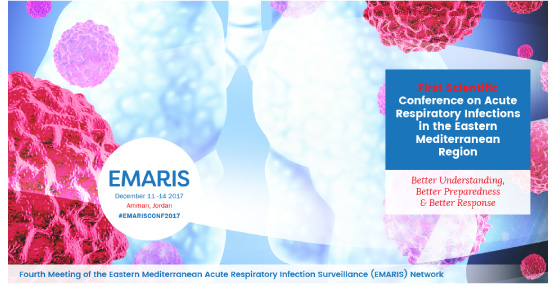
The World Health Organization’s Regional Office for the Eastern Mediterranean hosted the First Scientific Conference on Acute Respiratory Infections (ARIs) in the Eastern Mediterranean Region in Amman, Jordan from 11 to 14 December 2017.
The conference was held together with the Fourth Meeting of the Eastern Mediterranean Acute Respiratory Infection Surveillance (EMARIS) Network, in collaboration with the Eastern Mediterranean Public Health Network (EMPHNET).
EMARIS
EMARIS is a network of countries in the Region working together to strengthen and enhance influenza surveillance, improve the use of surveillance data for developing control programmes and for conducting research related to influenza and other respiratory viruses. Meetings of the EMARIS network have been held regularly since 2011 in order to share best practices for influenza surveillance, track progress, and draw important lessons on public health preparedness for pandemic influenza.
The fourth meeting documented progress made in the Region in the areas of surveillance, and response capacity in countries for seasonal and pandemic influenza. Reports from past meetings can be accessed below:
The scientific conference was held as a result of the recommendations of the third EMARIS meeting, in September 2015, to dedicate a day for scientific sessions in order to present research findings on the epidemiology, seasonality, and risk factors for influenza that are being generated from the Region.
Influenza surveillance background
Since 2006, the WHO Regional Office has been collaborating with the Influenza Division International Program of the United States Centers for Disease Control and Prevention (CDC), Global Disease Detection Program of the CDC Division of Global Health Protection, the WHO Pandemic Influenza Preparedness (PIP) Framework, and the U.S. Naval Medical Research Unit no. 3 (NAMRU-3) to establish and enhance the surveillance system for influenza-like illness (ILI) and severe acute respiratory infections (SARIs) in the Region.
The goal of this collaboration is to enable countries in the Region to collect quality epidemiological and virological surveillance data on influenza and influenza-associated illnesses in a timely and reliable manner with the overarching goal of improving pandemic influenza preparedness.This collaborative effort has been coupled with strong monitoring mechanisms to assess the progress of influenza surveillance in the Region using a set of indicators. At present, 19 of the 22 countries in the Region have implemented SARI and ILI surveillance, with enhanced data collection and analysis attributes. These countries routinely share their ILI and SARI surveillance data with WHO, using EMFLU – a publicly-available influenza surveillance portal developed by the Infectious Hazards Management programme in the WHO Health Emergencies Department in the Regional Office. The information shared is being used to develop informed policy decisions regarding effective strategies for prevention and control of influenza in the Region.
Objective
This was the first scientific conference in the Region on ARIs, and the main objective was to share up-to-date scientific information and research findings on disease surveillance, disease burden, aetiology, prevention (vaccination), preparedness, response, and networks on ARIs at national and regional levels. Moreover, the conference aimed to encourage junior public health professionals in the Region to improve their research skills.
Theme
The theme of the conference was Better Understanding, Better Preparedness, and Better Response.
Scope
This scientific conference provided a forum for young health researchers and health professionals in the public, para-public and private sectors throughout the Region to present their latest research findings in the area of ARIs, influenza surveillance, laboratory detection, collaboration at the animal-human interface, and related subjects.
Over 35 abstracts were presented either as oral or poster presentations, under the following thematic areas:
Respiratory disease surveillance and laboratory capacity
Influenza disease burden
Outbreak investigations and response
Emerging and re-emerging respiratory infections
Influenza vaccination
Pandemic preparedness and response
Influenza at the human-animal interface.
All the scientific proceedings of the conference (abstracts for oral and poster presentations) will be published in a special issue of The Journal of Infection and Public Health, a well-known scientific and peer-reviewed journal in the Region.
Keynote speaker
The keynote speech was delivered by Professor Salman Rawaf, Director of the WHO Collaborating Centre for Public Health Education and Training, Imperial College, London. He is an adviser to the World Health Organization on primary care, public health, health systems, medical education, and human resources for health development. Professor Rawaf presented his keynote speech on the evening of 11 December 2017.
Speakers
The following speakers presented key findings in the thematic areas of the scientific conference:
- Dr Ann Moen
- Dr Aspen Hammond
- Dr Eduardo Azziz-Baumgartner
- Dr Evelyn Basells
- Dr Ghazi Kayali
- Dr Hanan Al Kindi
- Professor Hassan Zaraket
- Dr Idris Saleh Al-Abaidani
- Dr Isabelle Bergeri
- Dr Jacqueline Katz
- Dr Jila Yavarian
- Dr Kinda Zureick
- Ms Maja Lievre
- Dr Mussab Al Saleh
- Dr Nasir Ahmad Stanikzai
- Dr Payman Hemmati
- Dr Rod S Daniels
- Dr Salah Al Awaidy
- Dr Stephen Lindstrom
- Dr Teresa Peret
- Dr Uzma Bashir
- Dr Weigong Zhou
Hosts and partners
The Fourth EMARIS meeting and First Scientific Conference was hosted by WHO’s Regional Office for the Eastern Mediterranean, with the US Centers for Disease Control and Prevention (CDC), and in partnership with Global Health Development (GHD).
Venue
The Fourth EMARIS meeting and First Scientific Conference was held at Amman Marriott Hotel in Amman, Jordan from 11 to 14 December, 2017.
Related links
Journal of Infection and Public Health
Eastern Mediterranean Public Health Network


